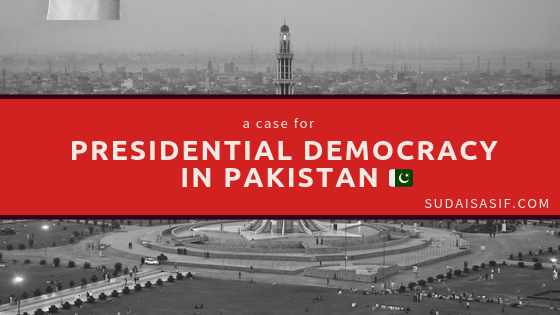In politics, the theory of “Separation of Powers” states that the executive, judiciary and legislative branches of the government should be completely separate in order to act as checks and balances against each other. Unfortunately, in the parliamentary system of democracy which we happen to have, the legislative and executive branch intermingles leading to a weak government. To elaborate upon this, let’s analyze the entire process.
Members of the national assembly are elected every 5 years. The party which hails the majority of the winning members gets to form a federal government. However, the problem arises when a party fails to achieve this majority which has happened in PTI’s case. Thereafter coalitions are formed. Perfect – we have a coalition which boasts the majority – now what?
A range of problems.
Firstly, we have Horsetrading. PTI has to keep the majority otherwise it risks the downfall of its government, hence it always has to be on good terms with its coalitionist parties. In order to appease his allies, the PM has to give ministerial positions to people who would otherwise seldom find a respectable job. Yet they find themselves at the helm of a ministry responsible for the affairs of millions of people.
The downside of this is that the prime minister is chained by a system that restricts him. If he is to prefer meritocracy and bring in technocrats that are actually qualified to do the job, his coalitions would break. Hence, he has no choice but to cave into compromises. And this doesn’t hold true just for the parties he has allied himself with but also with his own party members. If he was not to give those members elected ministerial positions, how would he keep their support? We’ve seen despicable instances of this holding true with the most recent example of Fawad Chaudhary being appointed the Minister of Science & Technology. Nothing against Fawad but for a little bit of backdrop, the man has zero experience in the aforementioned fields and yet such a crucial department is granted to him. A department which has the potential to help Pakistan raise its GDP exponentially is being wasted.
Secondly, due to executives in the upper and lower houses of the chamber, we have parliamentarians who engage in government-making rather than legislation. This results in our legal system falling behind which is a major contributory factor to the downfall of our Judiciary. Till present, we rely on the legislative acts and case law of our former colonial masters which should be a matter of shame for a country that has lent itself more than 70 years for development.
Thirdly, we have the problem of political bigwigs hindering the entrance of meritocracy in the political arena of Pakistan. Consider yourself as a common man, what do you have to do to make a difference in Pakistan through the political system? Running for parliament is a choice but would you succeed keeping in mind that our assemblies are not interested in the basic duties of a parliamentarian but their own politics? You wouldn’t. For this reason, the option remains of joining a political party. What happens when you join it? You have no option but to kiss up to party senior officials whose corruption has always disgusted you to the utmost yet no visible path finds its way to you.
Contrast this with the presidential system. Anyone can run for president and rise to the top without compromising on what they believe in. No one has to create a separate political party and wait to become its godfather. If you run in the national elections for members of parliament, you could rest assured that once elected, the MPs would actually do their duty and you would be able to fulfill the service you owe to the people. The president on the other hand who would be elected independently would be able to form a cabinet with qualified people. Our IT ministry would be going to men like Dr.Umar Saif whose technological prowess is recognized internationally not Dr.Khalid Maqbool who happens to have no past experience.
But a presidential system has many pitfalls?
Let’s analyze those. People argue that a presidential system grants the president sufficient powers to turn into a dictator as seen in South American countries such as Venezuela. These fears are true but ask yourself, are you not in a dictatorship right now? The only difference is that parties rule you, not individuals. Furthermore, the idea of a dictatorship today seems far from reality in a country like Pakistan where people and systems have matured to an extent that a dictatorship would not work leaving little incentive.
The second argument is of the call of the need for good people in the current system rather than changing the system in itself. It seems ideal theoretically where good citizens of a country have finally stepped in to save the motherland. But in practicality, such ideas are nothing but superficial considering our analysis earlier that the barriers to entry in our political system are too much for a good innocent soul to come along.
If we talk about Imran Khan having integrity as his followers claim to do so, I’d agree but only when he started off in 1996. What we see now is a man who had to shake hands with members of the very same party that supported Pervez Musharraf during his regime. And he has to, that’s how the system works and so a change is needed. Naturally, we’ve seen politicians like Bilawal Bhutto voice arguments against the presidential system and for good reason, it’ll take away his power which by the way was a result of inheritance and not by any democratic means in the first place.
Thirdly, we have the most legitimate and concerning of arguments – smaller provinces will suffer. I agree but only if we voting is carried out in proportion to the population where bigger provinces like Punjab will have an advantage. Instead, we could make use of an example from the United States of America. What happens there is that for Congress, all states are represented based on the population while the Senate has equal representation. This ensures that both houses keep a check on each other and members from the National Assembly cannot misuse their power to get larger provinces unfair rights.
Hence, considering this, it is high time that we move towards a presidential system where members of parliament are forbidden to be a part of the cabinet reducing opportunities for corruption; our new generation does not run away from politics for the thought of it being an unfair game; the president can rule independently without any fear thereby making real progress. To do so would yield considerable opposition as even a debate on this very matter does so today but it is not wise to shy away from it, we must embrace the hard path for a better system.



